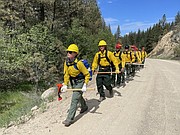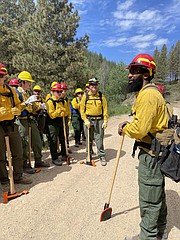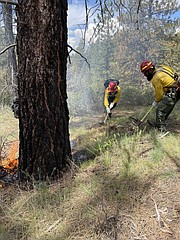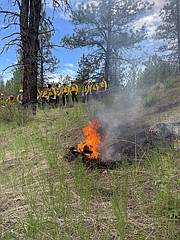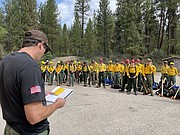A small, special force of firefighters
COEUR d'ALENE — When wildfires strike, there isn’t time to ponder who makes up the firefighting force on the frontlines of the blaze.
Wildland firefighters aren’t required to have a background in firefighting. Many new recruits are fresh out of high school or college, or looking to find a transitional job after serving in the military.
Josh Harvey, the fire management chief with the Idaho Department of Lands, said the agency always conducts a national search to find the right people for the job. Often, the agency relies on word of month for recruitment.
“It’s such a variety of folks working for us," Harvey said. "We take anybody and everybody and we invest a lot in our people. All of our crews have been hired. We’ve had a lot of new hires for this year, a lot of rookies. A lot of these kids are from here and live here.”
Training for wildland firefighting is completely separate from local fire departments that are trained to fight structure fires. Although the goals to prevent fire destruction are the same in many ways, that’s where the similarities end.
This year, the number of wildland firefighters with the IDL has swelled to 170, and the IDL experienced significant turnover compared to previous years. Though it’s unfortunate to lose some of the seasoned wildland firefighters, Harvey said the new recruits are ready and willing to face the season with their fire training at the ready, whether it turns out to be just a job or a lifelong career.
Environmental factors and causes of fire don’t take into account things like inflation or the increasing cost of rent when they strike. The IDL also often finds itself vying with the federal government and U.S. Forest Service for firefighters.
“We compete for a small pool of people,” Harvey explained. “Economically, it’s pretty tough. People go where the money is. The overall cost of living went up, but the governor and state are trying to boost pay for local firefighters.”
There are only about 3,000 wildland firefighters in the country, and although the IDL fire bureau has a base in Coeur d’Alene, the specialization of wildland fire training means those firefighters can be moved anywhere in North America.
“It’s kind of a niche job. It’s a dangerous one," Harvey said. "We send folks to Canada, Alaska, wherever there’s a need."
The conditions leading into summer left the region low in snow pack and ground moisture compared to past years, which led to the 141 fires that have already sprung up across the state so far this year.
2023 IDL wildfire resources include four air tankers, two scooper air tankers, two helicopters and 10 contract engines to supplement fire suppression.
Whether intentionally or accidentally started, wildfires can lead to hefty price tags. Harvey urged caution wherever people using or enjoying fires find themselves.
“Be smart. Prevention is always a big deal," he said. "Put your campfires out and don’t start a fire if you don’t need one. Whether you’re welding, running your lawnmower over dry grass or parking your vehicle, if you start a fire, it will cost you."
By the numbers
Wildland firefighters hired by Idaho: 170
Total wildfires in Idaho so far this year: 141
Caused by humans: 69
Undetermined: 39
Natural: 33
Acres of Idaho land burned: 1,369
Source: Idaho Department of Lands







